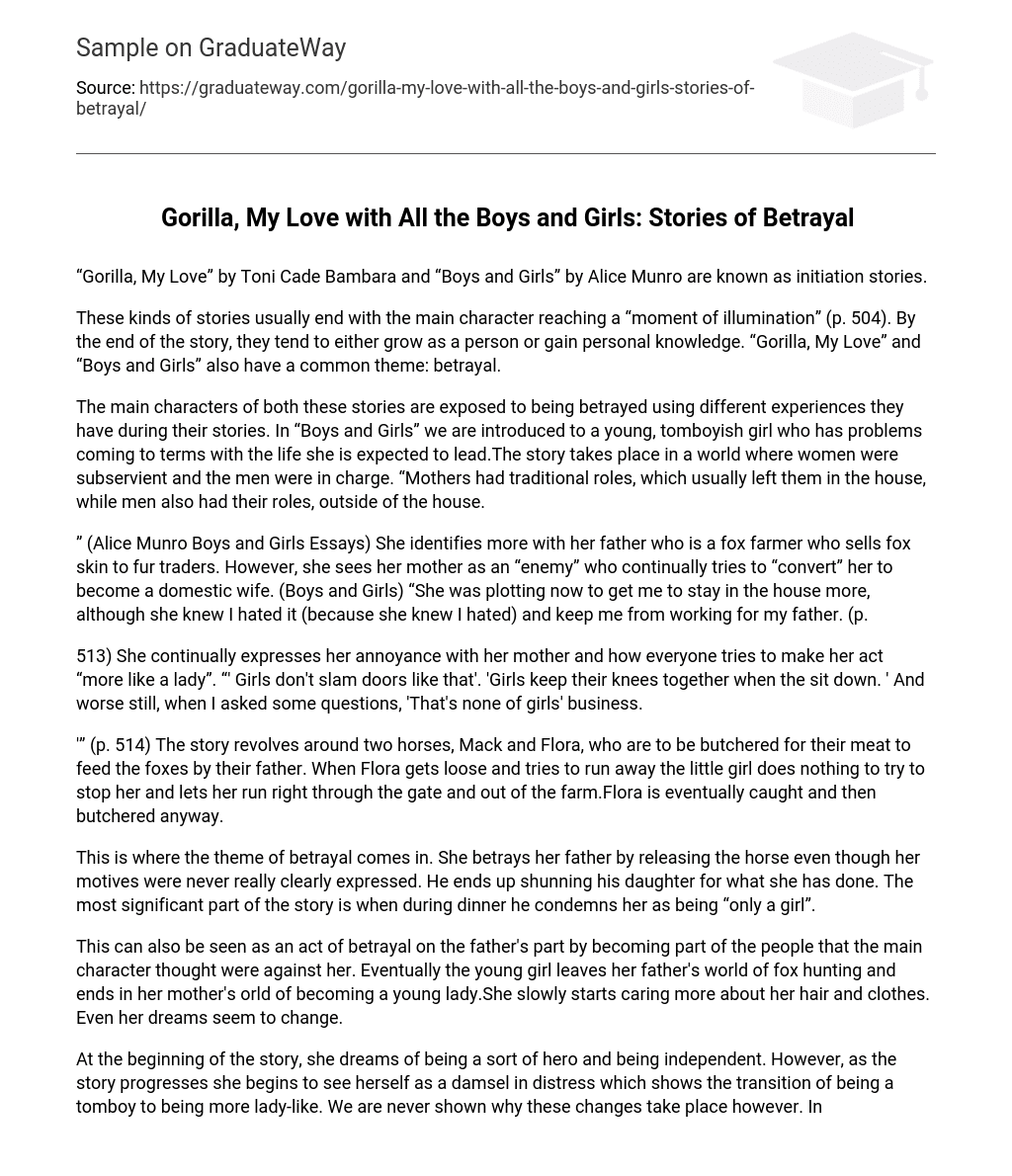“Gorilla, My Love” by Toni Cade Bambara and “Boys and Girls” by Alice Munro are both recognized as initiation stories.
These types of narratives typically conclude with the protagonist experiencing a pivotal moment of enlightenment (p. 504). Ultimately, they either undergo personal growth or acquire newfound knowledge. Furthermore, both “Gorilla, My Love” and “Boys and Girls” share a mutual theme of betrayal.
Both stories center around protagonists who face betrayal in various forms. In “Boys and Girls,” we encounter a youthful, tomboyish girl grappling with accepting societal norms for her gender. The narrative unfolds within a patriarchal society where men wield authority and women are expected to conform. Traditional gender roles confine women to domesticity while men assume duties beyond the household.
In her essay “Boys and Girls”, Alice Munro discusses how she relates more to her father, a fox farmer who sells fox skin to fur traders. However, she perceives her mother as someone who constantly tries to change her into a traditional housewife. Munro states “She was plotting now to get me to stay in the house more, although she knew I hated it (because she knew I hated) and keep me from working for my father.” (pg. )
513) The narrator consistently expresses her frustration with her mother and others who attempt to mold her into behaving in a more feminine way. She recalls comments such as, “Girls don’t slam doors like that,” “Girls keep their knees together when they sit down,” and the worst of all, when she asked certain questions, being told, “That’s none of girls’ business.”
“(p. 514) The story centers on Mack and Flora, two horses destined for slaughter to provide meat for the foxes, as ordered by their father. When Flora escapes and attempts to flee, the little girl stands idle, allowing her to pass through the gate and leave the farm. Eventually, Flora is captured and ultimately butchered.”
The theme of betrayal emerges when she releases the horse, betraying her father without clear motives expressed. As a consequence, he shuns his daughter for her action. The pivotal moment in the story occurs during dinner when he diminishes her as “only a girl.”
The protagonist sees her father’s decision to join the group she considered as her enemies as an act of betrayal, leading her to leave behind his fox-hunting community and embrace her mother’s world. In this new environment, she undergoes a personal transition into adulthood. As time passes, her focus shifts towards her physical appearance, which includes changes in hairstyle and clothing choices. Even her dreams experience a metamorphosis.
In “Gorilla, My Love” by Toni Cade Bambara, the protagonist starts off dreaming of independence and being a hero, but as the story unfolds, she starts seeing herself as a damsel in distress. This showcases her transformation from a tomboy to a more lady-like personality. The reasons behind these changes remain unexplained, but we are introduced to yet another tomboy in the story.
Throughout the story, it is only towards the end that we discover Hazel, an African-American girl, who strongly believes in being treated with respect, dignity, and upholding one’s commitment. The narrative commences with a scene of Hazel traveling in a car accompanied by Granddaddy Vale, Hunca Bubba, and her younger brother Baby Jason. Together, they are transporting pecans back home from the South.
This is where we discover that Hazel’s uncle, Hunca Bubba, has chosen to revert his name to Jefferson Winston Vale due to his newfound love. When Hunca Bubba reveals a photograph of the woman, Hazel becomes sidetracked as she notices the movie theater in the background of the picture. Recounting an incident involving herself, Baby Jason, and her sibling Big Brood, Hazel narrates how they decided to attend a film showcased by the theater called Gorilla, My Love on Easter Sunday. However, to their surprise, the advertised movie was not being screened and instead they found themselves watching Kings of Kings, a religious film centered around Jesus Christ.
Hazel, filled with anger, begins to shout out in feeling of betrayal. “And I’m prepared to take a life,” Hazel clarifies, “not because I have anything against Jesus. It’s just that when you’re all set to watch a gorilla picture, you don’t want to be bothered with Sunday school material. (p.
506) According to Hazel, her and her brothers begin “yellin’, booin’, stompin’, and carryin’ on” (p. 506), which catches the attention of Thunderbuns, one of the theater matrons. Hazel says that Thunderbuns is strict and doesn’t allow anything to get out of control.
“She does not play. She does not smile. So we keep quiet and observe the straightforward picture.”
504). Hazel is watching a movie when a scene of Jesus’ crucifixion appears. She thinks that Jesus is being portrayed too passively and that her family would never allow it. Her frustration builds when a Bugs Bunny cartoon comes on, which she has already seen. Big Brood supports her frustrations.
Hazel is determined to get her money back and confront the manager for falsely advertising that “Gorilla, My Love” was playing. She exclaims, “Aww sheet, we going to see the manager and get our money back. And I know from this we business.” (p. 507) Hazel then storms up to the manager’s office alone.
“(p. 507) The manager quickly begins treating Hazel as nothing more than a child and refuses to give her a refund. Just as the theater failed to deliver the movie it promised, Hunca Bubba also betrayed Hazel by promising they would marry and then marrying someone else. Hazel cries, which prompts her blood brother to cry as well, knowing that they must stick together or risk being forever lost.”
“(p. 509) Both of these stories have themes of betrayal. In Boys and Girls, the child betrays the adults, while in Gorilla, My Love, it is the adults who betray the child. The tomboys in both stories experience the frequent betrayal of the world.





